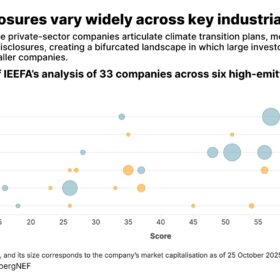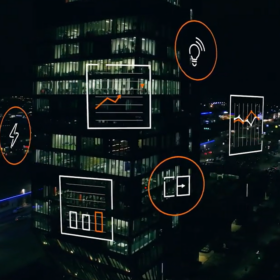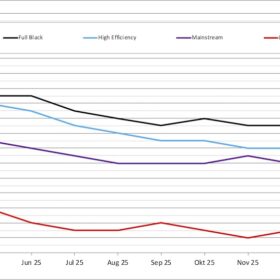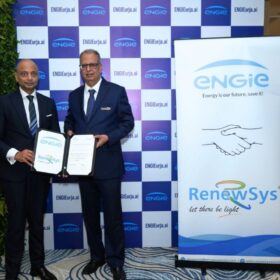India’s Union Budget 2026–27 removes customs duty on solar glass inputs, lithium battery cell machinery, and critical minerals processing equipment
India’s Union Budget 2026–27 extends basic customs duty (BCD) exemptions on the import of capital goods used for lithium-ion cell production for battery energy storage systems (BESS), as well as capital goods required for processing critical minerals. It also removes the 7.5% BCD on sodium antimonate used in solar glass manufacturing.
Credible transition plans key to unlocking decarbonization finance for India’s corporates
IEEFA’s assessment finds that while most companies have announced net-zero or emission reduction targets, only a limited number link these goals to capital expenditure plans, revenue assumptions or changes in business strategy, making it difficult for investors and lenders to assess the feasibility of transition pathways.
Powering India’s digital transformation: The backbone technologies you don’t see
Every new 5G deployment, data centre expansion, or broadband rollout depends on power and cooling architectures that operate quietly in the background, ensuring continuity, efficiency, and resilience.
The future of impact funding: Aligning capital with sustainable outcomes
The largest area of green financing is energy-efficient machinery, which supports MSMEs in modernising production lines and reducing operational energy consumption. Significant capital is also being channelled into rooftop solar installations, electric vehicles, and enterprises operating in the water, sanitation, and hygiene (WASH) sectors, across clusters such as manufacturing, healthcare, and food processing.
Smart Joules raises $10 million in Series B funding from Neev II Fund, Waaree Renewable Technologies, and Spectrum Impact
Smart Joules will use the proceeds to expand its energy-efficiency and cooling operations into newer sectors and larger-scale projects, including manufacturing, building automation, and district cooling, while further strengthening the company’s technology, analytics, and on-ground execution capabilities.
AI for climate action: Can technology save us from the crisis?
A modern grid must balance growing demand from new sources like electric vehicles (EVs) with the intermittent supply from renewable sources like solar and wind power. AI-powered smart grids use sophisticated algorithms to forecast power demand and match it with fluctuating renewable generation in real time.
Waaree Renewable Technologies invests in Cooling-as-a-Service company Smart Joules
Waaree Renewable Technologies Ltd, the solar EPC arm of Waaree Energies, today announced a strategic investment in Smart Joules, India’s largest Cooling-as-a-Service (CaaS) and energy efficiency company.
The future of decarbonization is digital: Leveraging SaaS and automation for real-time emissions tracking
As global investors, consumers, and regulators demand deeper climate accountability, India’s position as a manufacturing and export hub will increasingly hinge on how credibly its businesses can measure and manage emissions. That credibility will come not from declarations, but from data.
How IPPs are revolutionizing India’s energy market
Independent power producers have captured a significant share of India’s clean energy capital, with projects often backed by substantial financing from institutions like the Indian Renewable Energy Development Agency (IREDA). Additionally, these have the ability to raise money in a cautious global market because of their capacity to lock up bankable power purchase agreements (PPAs), which provides financial predictability.
Solar power for smarter, greener cities
India’s solar journey is not just about energy generation, it’s about transforming how cities are built and lived in. A multidisciplinary approach involving policy, technology, and civic engagement will be crucial to accelerate this transition. With the right push, India can lead the global shift toward climate-resilient, smart, and sustainable urban ecosystems.















